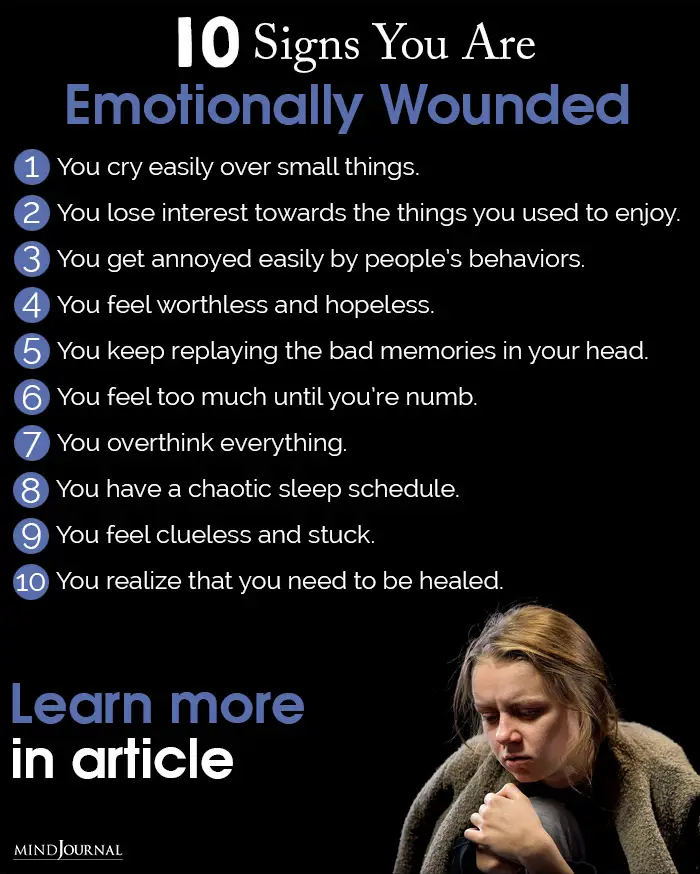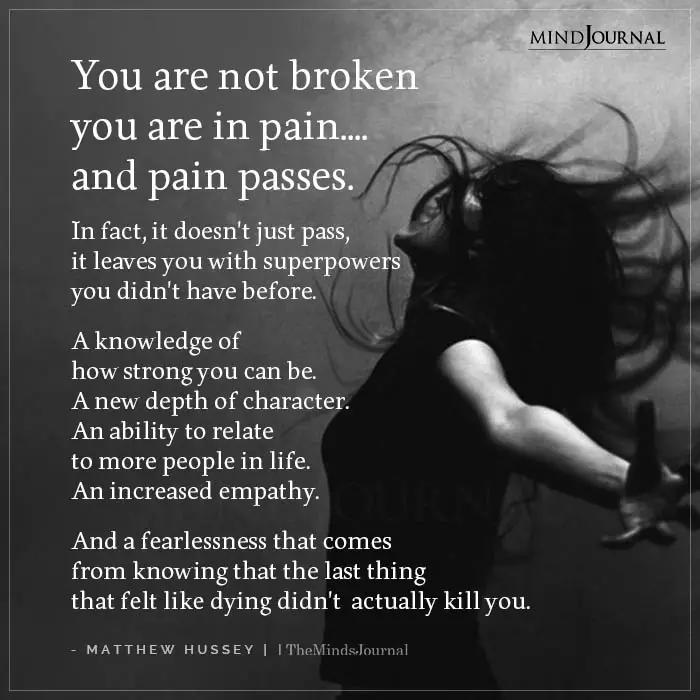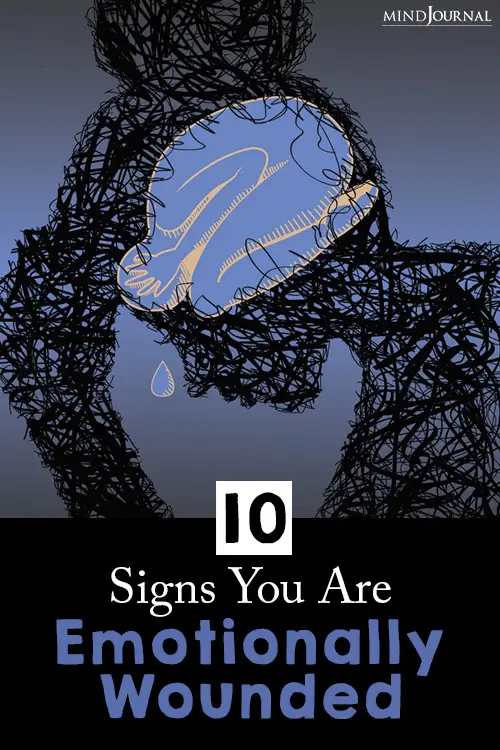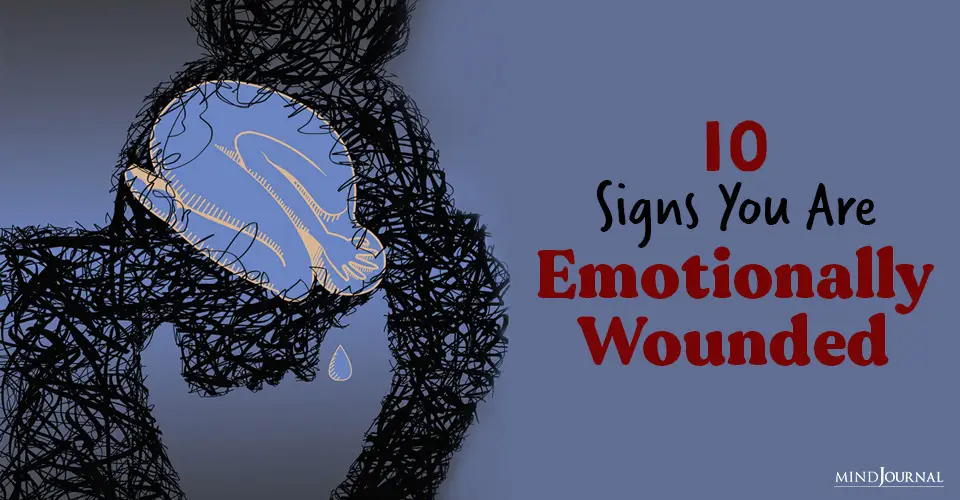Emotional wounds can probably cause the most pain to someone, and when you are emotionally wounded, it can hurt so much. Physical pain and scars can be treated and they might even disappear after some time, but emotional wounds? Not so much.
Here Are 10 Signs You Are Emotionally Wounded

1. You Cry Easily Over Small Things.
When you have emotional wounds, it’s for you to be in tears because you always feel the pain within yourself subconsciously. You will cry over movies or books and you become emotional when you see something that touches your heart.
When you find yourself crying too much, pay attention to your inner well-being as it might be a sign that you’re hurting inside.
2. You Lose Interest Towards The Things You Used To Enjoy.
Emotional wounds will make it difficult to concentrate and focus on the things you used to do. You will be demotivated because your negative emotions are most likely more in charge than you realize.
Once you realize that you are no longer enjoying the things you used to, ask yourself why and don’t be stuck doing anything. The more you do nothing, the more you will feel the pain of your emotional wounds.
Related: 5 Steps To Heal An Emotional Wound
3. You Get Annoyed Easily By People’s Behaviors.
Having emotional wounds will also make you easily triggered emotionally by people’s behaviors around you. You will be highly sensitive towards people’s words, intonations, questions, even their jokes. The emotional wounds that you’ve had will make you avoid interactions with other people and it leads to social withdrawal.
Even though having quality time with yourself is important, remember that being open with other people can also help you reduce the pain of your emotional wounds.
4. You Feel Worthless And Hopeless.
Having emotional wounds will most likely make you look down on yourself and feel worthless. You will blame yourself and feel stupid for being hurt so much. You will also feel hopeless and broken beyond repair.
When you feel like you are at the lowest point of your life, try to reach those people who are really close to you. Let yourself be cared for and loved because social support could increase your self-esteem and make you feel better about your circumstances.

5. You Keep Replaying The Bad Memories In Your Head.
When you can’t forget a painful experience in your past and it keeps replaying in your head, there’s a possibility that it has become one of your emotional wounds. Your inability to forget a painful experience is actually a sign that you should acknowledge that experience and accept the hurt.
Try to identify and look for the reasons why it made you hurt so much and accept that being hurt because of that experience is totally okay and normal.
Related: 11 Typical Behaviors That Emotionally Hurt People Display Unknowingly
6. You Feel Too Much Until You’re Numb.
Most of the time, your emotional wounds are so painful it makes you feel nothing instead. You will go through the day almost on autopilot which makes you care less about your surroundings. You no longer feel happy or sad; you just exist, but you don’t feel alive.
Your numbness is actually your coping mechanism to survive your emotional wounds. Try to regulate your emotions since it could also be a coping mechanism for lowering your psychological distress.
7. You Overthink Everything.
Having emotional wounds will make you insecure about your life and it will most likely make you overthink everything. You overthink because you don’t want to be hurt again. Thus, you will feel that it’s important for you to think and control everything around you and instead of feeling better, your overthinking habit will make your emotional wounds even worse.
8. You Have A Chaotic Sleep Schedule.
Because of your overthinking habit towards your emotional wounds, it will be hard for you to fall asleep at night. Your mind will be full of thoughts and the nighttime is usually the time when you will feel so desperate, lonely, and depressed. Your sleep schedule will change as it’s hard for you to sleep at night and you’ll overcompensate during the day.
9. You Feel Clueless And Stuck.
Emotional wounds can also make you feel so confused and lost. You will feel like you have nowhere to go and nobody can really heal your wounds. You will have so many negative self-talks inside of you and your mind is usually tangled all the time.
Try to control your confusion and untangle your thoughts by writing in a journal and remember to take it one day at a time.
Related: The Stages Of Grief: Ways To Cope With Loss and Minimize The Pain
10. You Realize That You Need To Be Healed.
Although it’s hard for you to explain it to other people, you just feel like you are broken inside and you know exactly what you need to be healed. You will look for many distractions to get over your emotional wounds and as time goes by, you will realize that they won’t be healed over one night.
Having emotional wounds is totally okay as long as you acknowledge and admit it. Try to find some cathartic activities to heal your wounds such as writing, playing music, meditating, and doing sports.
In the end, no matter how painful your wounds are, you will heal and get over it sooner or later. You are doing okay.
Written by Rayi Noormega
Originally appeared on Thought Catalog
Follow more of her work at Rayinoormega.com or follow Rayi on Instagram











Leave a Reply
You must be logged in to post a comment.